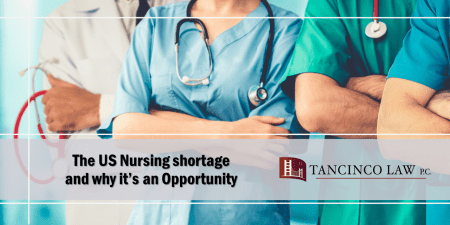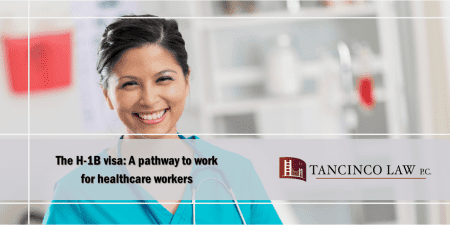Application for the H-1B visa is around the corner as the new year of 2023 is fast approaching. This year, the H-1B registration ran from March 1 to March 18. Let’s talk about how it works and if you or someone you know can qualify for it and can even benefit from its cap exemption.
This may benefit those especially in the healthcare industry.
Understanding the H-1B
The H-1B visa is known to be for professionals in general, but what is commonly understated is how healthcare workers can apply for this visa.
The H-1B visa is a temporary visa for professionals in specialty jobs that typically require a bachelor’s degree or an equivalent. The US employer (not the worker) must file a petition, and if granted, the H-1B will be valid for 3 years and can be renewed for 3 more years.
The cap you need to know
Since there are so many professionals who seek the H-1B visa yearly, the United States government has placed a cap on the number of people who can get them. To decide who to give the H-1B to, they hold a visa lottery – choosing who gets the visa randomly.
The H-1B visa lottery is limited to 65,000 H-1B visas for each fiscal year, with an additional 20,000 saved for people holding a master’s degree or higher from a US institution.
Before you even start stressing about the H-1B lottery, it’s important to understand which jobs qualify for this visa. Only specialty occupations qualify for an H-1B, which means that the job requires a bachelor’s degree or higher (or its equivalent in work experience) in a specialized field like IT, engineering, or medicine. But, not every medical job is eligible for an H-1B.
Which healthcare workers are eligible for H-1B visas?
While a majority of health care works are educated and specialized, only some types of health care jobs qualify for an H-1B visa. The three main categories of healthcare jobs that qualify for H-1Bs are nurses, physical therapists, and physicians. Here’s what you need to know about each category.
Nurses
As far as nurses go, generally only nurse practitioners, nurse administrators, and nurse managers are generally qualified for an H-1B. Why not RNs? Well, registered nurse (RN) positions normally require only a two-year degree, so RNs don’t meet the standard educational requirement for an H-1B. However, there have been instances where RNs with really specialized knowledge and perhaps an accompanying certificate, e.g. an emergency room cert, may qualify.
Physical therapists
Because a bachelor’s degree is generally a minimum standard requirement for this kind of work, physical therapists are generally eligible for an H-1B visa. Foreign physical therapists must, of course, have a bachelor’s degree or equivalent, have their educational credentials verified through FCCPT, and obtain a US state PT license.
Physicians
Doctors may apply for an H-1B visa to participate in a residency program, teach or conduct research, and work at a healthcare facility. Each doctor must pass the three-step examination for medical licensing through the United States Medical Licensing Examination (USMLE). This test examines clinical knowledge, clinical skills, and includes a spoken English assessment.
There are approximately 127,000 immigrant physicians in the US who account for nearly a quarter of all the country’s licensed physicians. A majority of these doctors come from India, the Caribbean, Pakistan, Philippines, and Mexico. As you can see, the US relies heavily on foreign-born physicians.
Can healthcare workers be exempted from the cap?
Yes.
Some hospitals and health care systems qualify for an H-1B cap-exemption. This allows USCIS to approve H-1B visa petitions for some professions beyond its 85,000 annual cap, and applications for such positions can be filed during any time of the year.
A qualifying nonprofit institution of higher learning or a qualifying nonprofit affiliated with an institution of higher learning can be cap-exempt. H-1B cap-exempt health care categories include:
- Institutions of higher education (colleges and universities)
- Non-profit entities related to or affiliated with institutions of higher education
- Nonprofit research organizations
- Federal government research organizations
- State and local government research entities
A healthcare organization, such as a hospital, can be cap-exempt if it can prove it’s related to or affiliated with an institution of higher education. This nonprofit relationship or affiliation can take the form of ownership or board control, or even formal research cooperation.
Unsure about how you can get an H-1B visa? Consult your trusted immigration lawyer.



